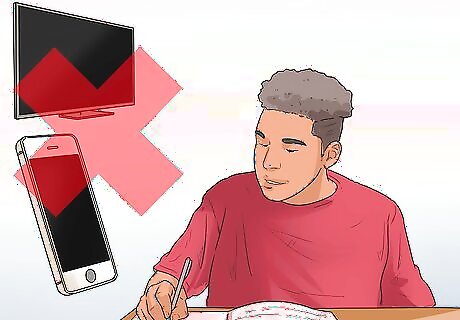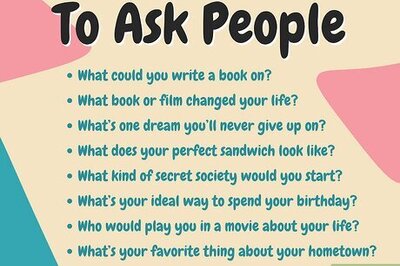
views
Figuring Out What You Need to Do

List the work you haven't done yet. In order to catch up in school, you'll need to start by figuring out exactly what you need to catch up on. Start by writing up a list that includes all the work you need to get done. This should include assignments that are past due as well as work that is coming due in the near future. For each each task, note the due date and what, exactly, you still need to do. It should include readings you haven't done, papers you haven't turned in, and other homework that is past due or due soon.

Meet with your teachers. Ask your teachers to meet with you for a few minutes to discuss the situation. Let them know that you know you are behind and are trying to catch up. Ask what help or advice they can give. Your teachers should be able to tell you which assignments they will still accept. This way, you don't waste time doing work that is so late you will no longer receive credit. They may have advice on how you can get work done faster or more efficiently. They should also be able to tell you which tasks are most important to your grade. In some cases, teachers may be willing to grant you extensions on deadlines, especially for work that hasn't come due yet. If you show you are genuine in your desire to learn the material and get caught up, some teachers will be lenient.

Prioritize the list. After meeting with your teacher, rank the items on your list in order of importance. Remove any tasks that it is no longer possible for you to get credit for. In prioritizing work consider the point value of each task. Consider how you are doing in the classes the various assignments are for. You should prioritize those tasks that will make the biggest difference in your grades. If there is a class you are at risk of failing, assignments from this class will be most important. You should also consider due dates in prioritizing your list. Focus on those things that are either the oldest, or that you can get done before the deadlines pass for maximum credit.
Getting the Work Done

Make a plan. Once you've figured out where to focus your energies, sit down with a calendar or planner and set some goals. Figure out when you can reasonably get things done by. Setting deadlines for yourself will help you track your progress and keep you accountable to yourself.

Schedule work time. Next, establish a set period of time each day that you will dedicate to catching up on your work. Stick to this plan, every day. The amount of extra school work time you will need to set aside will depend on how much you need to get done. In some cases, an extra hour a day might be enough, but in others you may need to set aside much more time. Think about the time of day you feel most productive. If you're more of a night owl, you might prefer doing your extra work after dinner or before bed, for instance. To succeed, be aware that you will probably have to step back from some of your other activities, at least temporarily. You may need, for example to spend less time with your friends, stop going to club meetings for a while, skip a few piano lessons or soccer games, or even withdraw from certain time-intensive activities entirely.

Dig in and get the work done. Once you have a plan, stick to it. Work every day to make progress on your school work. Just keep in mind that you'll have to be the one responsible for motivating yourself if you want to get caught up. If you are having trouble staying focused on your work during long work sessions, try building some short breaks into the schedule. This can help boost your productivity and creative thinking. Getting a little extra exercise can also help you stay focused. During work times, turn off your phone if you can, log out of social media, and make sure there aren't other distractions around such as a TV on. Having a well organized work space that is free of clutter and distractions can also help.
Staying Caught Up

Use a planner. Once you get caught up, you can probably ease up a little on your work schedule, but you should maintain the same organization and discipline. Keep using a planner or calendar to keep track of work deadlines. Sometimes people get behind because they just forget when things are due. Keeping a planner or setting reminders in your phone can prevent this.

Set aside adequate time for school work. Being caught up doesn't mean you can go back to the way things were before. The fact that you got behind in the first place probably means you weren't setting aside enough time for school work. As before, establish a certain time each day to work on school work, and stick to it. Evaluate the activities you are part of outside of school and figure out which ones are most important to you. That way, if you have to let something else slide in favor of school work, you know what you're willing to skip or drop out of.

Consider joining a study group. Many students find that studying with other people not only allows them to pool their knowledge, but also helps them be more organized and accountable. If you've agreed to meet with people to work at a certain time, that creates social pressure that doesn't exist when you are just working alone. If you decide not to work on your own, you are failing to live up to your own goals, but if you decide not to meet with your study group, you'll be letting other people down, too.

Reward yourself for success. Devise a system of small rewards to motivate you to get work done. Whenever you get a project in on time, give yourself one of these rewards. This rewards can be anything that you enjoy. It could be your favorite candy, a new article of clothing, a song purchased online, or an activity like a trip the mall with your best friend of a little time spent playing your favorite instrument. These rewards are motivating because they create a positive association in your mind with getting things done on time. Your brain will start to understand that completing a task leads to something positive, and this can help you feel more motivated to work.
















Comments
0 comment